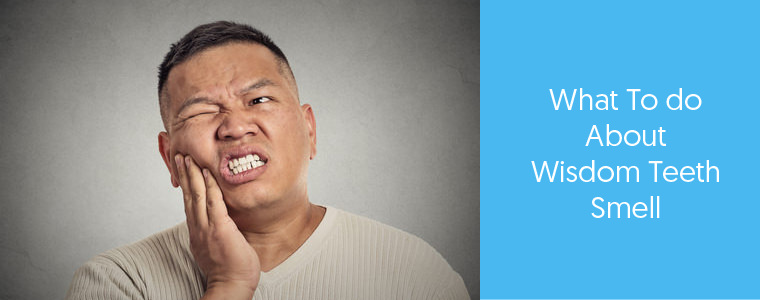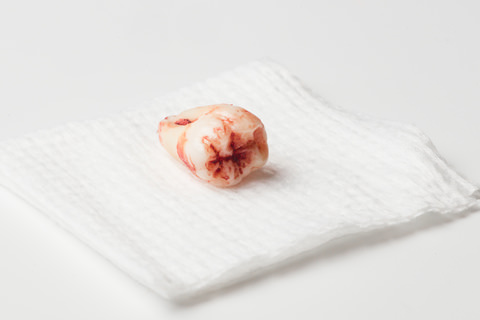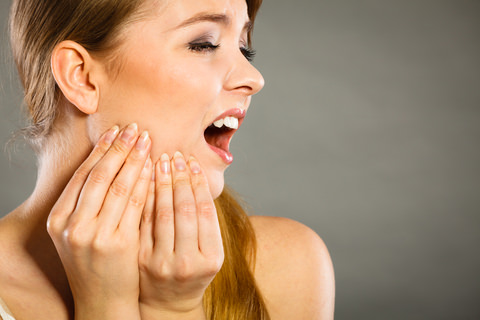Wisdom Teeth Smell – The Causes & How to Put it to an End
Wisdom teeth – those third set of molars that erupt in the back of your mouth, usually in your late teens to mid-20s.
We all know that the pain they give you are just awful, but the smell really is just as bad. So, you may be left wondering – why is it that wisdom teeth smell?
Halitosis, or bad breath, is a common issue caused by your wisdom teeth – and there can be many reasons behind what produces this problem.
Infections from poor dental hygiene, pericoronitis, decay, periodontal disease, and more – wisdom teeth really can cause a lot of trouble.
In this article, we discuss what you can expect to experience from your wisdom teeth, how you can prevent a severe case of bad breath from arising, and what you can do to stop your wisdom teeth from smelling if it has already become an issue.
After all, nobody wants to be that “bad breath” person.
How do you Stop your Wisdom Teeth from Smelling?
Your wisdom teeth often do not have enough room to erupt in the correct position in the back of your mouth, and so they may only partially emerge from your gums.
Due to them being positioned in that “hard to reach” location, it can be very difficult to keep your wisdom teeth clean. This makes them more susceptible to infections, decay, and gum disease, all which causes your breath to smell.
A good dental care regime will help stop your wisdom teeth from smelling.
Try including the following into your daily ritual;
Brush your Wisdom Teeth with a Smaller Toothbrush
You must ensure you keep the area of your mouth where your wisdom teeth have partially erupted clean.
To do so, try brushing your teeth with a toothbrush that has a smaller, or narrower, head – this will make it easier for you to clean those “hard to reach” spots where your wisdom teeth are positioned.
We found that the Philips Sonicare range of toothbrushes, especially the DiamondClean 9000 has the perfect sized brush head to get into those areas that need attention.
Ensure you brush twice daily, morning and night. Brush with great care – use a soft toothbrush with a lot of bristles, softly and slowly in gentle, circular motions, and don’t forget to brush your tongue.
Floss your Teeth
Make sure you floss your teeth at least once a day, especially around your wisdom teeth, to rid yourself of any debris that may have gotten stuck between your teeth and gums.
Rinse your Mouth
After brushing and flossing your teeth, rinse your mouth using clean water or an antiseptic mouthwash like Colgate’s Savacol Antiseptic Mouth and Throat Rinse.
Evidence suggests that mouthwash assists in reducing plaque and gum disease, for the most part helping to increase your oral health.
Rinsing also helps remove any debris that may still be lodged in your mouth and get rid of any germs.
Take great care when rinsing and spitting if you have had your wisdom teeth extracted – any excessive force may end up displacing your blood clot, resulting in a dry socket.
Use an Oral Irrigator
An oral irrigator, or a small plastic syringe, is useful to assist in rinsing the areas close to your wisdom teeth that are otherwise hard to reach.
Use your irrigator after eating, and before bed, and this will help you remove any debris that is lodged between your teeth and gums.
A well known and quality oral irrigators or Water Flosser is the Waterpik. Available in a few different models and sizes, I like the handle held Advanced Waterpik which doesn’t take up room in the bathroom and has a good amount of water capacity.
Available from most chemists or Amazon online, you can fill your irrigator with a homemade saltwater solution (see home remedies below) to rinse your wisdom teeth.
Ensure you Keep your Mouth Moist
A dry mouth will produce more bacteria.
To reduce your chances of bacteria production, and thus infection, try to keep up your intake of water. Water will also cleanse your mouth of any food particles.
Visit your Dentist on a Regular Basis
Normally, you should visit your Dentist every six months to check-up on the health of your mouth.
However, if you are having any issues with your wisdom teeth, you may want to schedule more frequent visits and be sure to discuss your problems with your Dentist.
If you have had Surgery for Wisdom Teeth Removal
Ensure you follow instructions given to you by your Dentist. This will include trying to chew less on your rear teeth, as it may put unnecessary force on the area where the extraction was performed, resulting in a dry socket.
Also, do not smoke for 2 days after surgery, as this too can disturb the blood clot and cause a dry socket, and alcohol should also be avoided as this will further dehydrate your mouth.
You may need to change your diet – soft foods and liquids only and avoid sugar.
Is it Normal to have this Odour?
Your wisdom teeth are the very last teeth to develop in your jaws, usually in your late teens to mid-20s.
As a result, there is often not enough space for them to erupt into the correct position in your mouth.
This may be because of impaction (that is if they are too close to the neighbouring teeth), partial eruption, becoming covered by a flap of gum tissue, or more.
All these problems create other issues that can cause your wisdom teeth to smell, both before and after they are removed.
Prior to removal, issues that cause your wisdom teeth to smell include;
Poor Dental Hygiene
Your wisdom teeth become easily infected, and infections bring about that awful smell. Poor oral hygiene is a trigger for infection because your wisdom teeth are not always kept clean.
The main reason your wisdom teeth become infected is still because of where they are positioned in your mouth – they are in that “hard to reach” spot, and so you may not always take proper care of them when brushing and flossing.
If they are not properly cleaned, there is a higher chance of food, other debris and plaque on or surrounding your wisdom teeth, and this leads to a higher chance of bacteria production in this area.
Infections/Pericoronitis
Once again, due to the location of your wisdom teeth, there may not be enough room for them to erupt in full, and so one may only partially emerge into your mouth.
If this happens to you, this tooth may become covered with a flap of gum tissue, making it easy for food particles, debris, plaque and bacteria to all get trapped underneath this.
This results in a wisdom tooth infection known as pericoronitis, a major symptom of which is bad breath.
Tooth Decay
You may not always notice symptoms of your wisdom teeth erupting, so you may not always be aware of any problems developing inside your mouth.
Your wisdom teeth may not always emerge vertically, but sometimes grow horizontally, meaning they are placing pressure on your tooth in front, leaving that tooth and your wisdom tooth itself at a high risk of decay – another cause of bad breath.
If you do not remove your wisdom tooth in time, the decay may get so bad that you will begin to notice the symptoms of pain from both teeth, and then your Dentist will have to repair or even extract the tooth in front once they have removed your wisdom tooth.
Periodontal (Gum) Disease
Gum disease is another cause for persistent bad breath, your wisdom teeth may develop cysts that may slowly grow bigger.
This will cause damage to the surrounding bone, leading to periodontal, or gum disease.
The bad breath after your wisdom teeth removal may stick around for a while too – sometimes this may be normal, and sometimes it may be a cause for concern.
Common Causes for Bad Breath that should Disappear within 24 – 48 hours
Bleeding/Blood Clotting
It is normal for you to have a lot of bleeding at the site your wisdom tooth was extracted, which can result in bad breath.
A blood clot should also form at the site your wisdom tooth was extracted – this acts as a protective layer for the bone and nerve endings in your now-empty tooth socket. However, it also creates a place for the growth of bacteria, this too leading to bad breath.
No sooner than 24 hours after your extraction, try rinsing your mouth with saltwater – this may help clean the clot, and reduce pain and inflammation.
Poor Oral Hygiene
We all know that it is very important that you keep up a good dental care regime to reduce the risk of infection and bad breath.
However, after a wisdom tooth extraction, your teeth and gums will be very sensitive, and you should actually leave the area untouched whilst it is in the process of healing.
Unfortunately, this can cause food, other debris and plaque to build-up on the surrounding areas, causing bad breath.
It is recommended that, to assist with this issue if brushing you only use a soft toothbrush, rinse your mouth with lukewarm water, and also saltwater as mentioned above.
Medication
Certain medications, including pain medications, may also be the cause of your bad breath, as they can cause a dry mouth.
Pain medication is common after wisdom teeth extraction to alleviate your level of discomfort, and this results in you producing less saliva, which is your mouth’s natural defence against bacteria. Less saliva equals more bacteria, resulting in bad breath.
Dry Socket
A dry socket is a painful disease, that occurs when the blood clot at the site of your wisdom tooth extraction either does not develop, dissolves or gets displaced before the wound has had time to heal.
As the blood clot was the protective layer for the empty tooth socket, this means the site is now unprotected, leaving your bone and nerve endings exposed.
This exposure results in intense pain, inflammation of the socket, and the socket can become filled with food debris and the growth of bacteria – all of this resulting in bad breath.
You should visit your Dentist immediately if you think that you have developed a dry socket – they can lead to serious infections and diseases and should be taken care of straight away.
As soon as your extraction site from the removal of your wisdom teeth has healed, your bad breath should disappear. If not, you should consult your Dentist immediately.
What Should you do About it?
Your wisdom teeth may be straightforward to remove, and you may not have any further issues afterwards – your bad breath should disappear within 1 – 2 days.
Your general Dentist may be able to remove them, or if your case is a little more complicated, they may be able to refer you to see a specialist Dentist to perform the procedure.
You may be able to have them removed on the same day as your initial appointment in as little as a few minutes, with little risks and full recovery in up to a fortnight.
If your wisdom tooth is in a position where it is not causing you any issues, and there is little to no future risk of problems developing, then you can have a discussion with your Dentist and may choose to leave it in place.
Your Dentist will need to continue to review it at your six-monthly check-up appointments to ensure its’ health and safety.
If the risk of leaving the wisdom tooth in place increases with age, treatment may be needed – this choice can be discussed with your Dentist when the time comes.
What are some Home Remedies to Reduce Wisdom Teeth Smell?
Some simple home remedies for reducing the smell from wisdom teeth include;
Saltwater Mouth Rinse – If your gums are inflamed, try rinsing your mouth with saltwater instead of mouthwash – saltwater will act as an antiseptic agent.
A simple homemade remedy is half a teaspoon of salt in a glass of lukewarm water and swishing this around in your mouth for thirty seconds after every meal can help decrease any inflammation thus assist in reducing any pain.
Chamomile Tea – You may also find chamomile tea soothing for inflammation, so you can try rinsing with this once a day.
Chew on Mint Leaves – This natural remedy has been used for decades as a way of keeping breath fresh.
Drink More Mater – Keep up your intake of water, ensuring you do not get a dry mouth and produce any bacteria.
Clove oil – Take some clove oil and put it onto a cotton ball, then place the cotton ball directly onto your tooth. If the flavour of the clove oil is too strong, dilute it with a little bit of olive oil.
Vanilla Extract – As with the clove oil, you can put a vanilla extract on a cotton ball and then rub it on the affected area.
What are the Best Products you can Buy to Reduce Wisdom Teeth Smell?
There are 4 products that can help reduce wisdom teeth smell, but also bad breath in general.
Let’s take a look below.
Oral Irrigator or Water Flosser
An oral irrigator or flosser will help you rinse the areas close to your wisdom teeth that are otherwise hard to reach.
It uses water to help you remove any debris and plaque that is lodged between your teeth and gums and can be lowered in force so can still be used after wisdom tooth extraction.
Waterpik have a few sizes and options available. If you have room in your bathroom, the Waterpik Ultra Professional Water Flosser is a good choice.
If you need something that is a little smaller and more compact, try the Waterpik Cordless Advanced Water Floss.
Antiseptic Mouthwash
A good antiseptic mouthwash includes hydrogen peroxide, rubbing alcohol and iodine, all of which deter bacterial growth.
There are a few on the market that can be considered. Listerine is a well-known brand for Mouthwash and their Listerine Ultraclean Arctic Mint Antiseptic Mouthwash is effective.
Another option is Colgate’s Savaol Antiseptic Mouth and Throat rinse.
A Great Toothbrush
If you are after a manual toothbrush try using a soft toothbrush like Doctor Plotka’s Mouthwatchers Toothbrush. These toothbrushes were made by top Dentist, Dr Plotka, who has been practising Dentistry for over 40 years.
With over 2000 patent flossing bristles that are 1/1000th the width of a human hair on each brush, they are able to reach every area of your teeth and gums.
They are soft and antimicrobial, meaning they kill 99.9% of the bacteria on the brush within a 6-hour timeframe, and they do so naturally by the bristles which are infused (not coated) with Silver.
Should prefer an electric toothbrush, it’s hard to beat the Philips Sonicare DiamondClean 9000 Electric Toothbrush. We’ve reviewed it and it scored high in almost all categories.
See our in-depth review here.
If you are an Oral-B fan, try the Genius 9000 Electric Toothbrush, a quality product also. Our review looks that this toothbrush, thoroughly.
A Tongue Scraper or Cleaner
Tongue scrapers are specially designed to apply even pressure across the surface of your tongue.
If you are unable to brush your tongue with your toothbrush, a tongue scraper will help remove all the bacteria and food debris.
Dr Tung’s Tongue Cleaner is a quality product and should be considered if you are after a tongue scraper.
What can you do to Prevent “Wisdom Teeth Smell”?
As you can probably tell by now, the main cause of “wisdom teeth smell” is a bad dental care regime, that leads to inflammation, infection, and further diseases.
To prevent this, simply ensure you embrace a healthy dental care regime by following the tips I have outlined in this article.
If you ensure you submit to these practices from the start, including visiting your Dentist on a regular basis so they can check-up on the health of your wisdom teeth, you should have nothing to worry about when it comes to that “wisdom teeth smell”.
A few extra hints I can give you which include making lifestyle changes, such as;
- Do not eat foods that sour your breath – the main offenders being onion and garlic
- If you are a smoker, give it up for good – this doesn’t help with the way your breath smells
- Avoid alcohol as much as possible as it dehydrates you
- Avoid sugar – try chewing sugarless gum, as this stimulates saliva, your mouths’ natural defence against bacteria
- Use a humidifier at night-time in your house – as well as drinking water, this moistens the air in your house, helping keep your mouth moist
Conclusion
Wisdom teeth – not only do they feel awful whilst erupting, but they can also smell awful too. They really do have a lot to answer for – being an offender for infections, pericoronitis, decay, periodontal disease, blood clotting, dry socket, and more.
The main reason for these diseases and the cause behind that awful smell, though? Pretty simply put, it’s a poor dental hygiene routine.
So, brush, floss, rinse, keep your mouth moist, use an oral irrigator, make a few easy lifestyle changes, and even try a few home remedies, and you can rid yourself or even prevent that stinky smell once and for all.
Oh, and above all, don’t forget to visit your Dentist every six months – after all, they are the ones who will help you decide whether to keep or extract all the wisdom you have in that mouth of yours.
By Dr. V
Created at June 05, 2019, Updated at January 25, 2025






